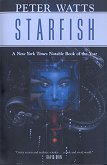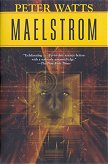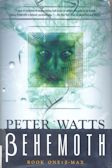It’s the late 21st century. Two months ago thousands of alien
objects “photographed” the earth, and sent a message to the
stars. A faint source is seen outside the solar system – is it an
invasion? A crew of neuro-enhanced expendables is sent off to find
out. What they find blows all theories of alien contact out of the
water.
This is fascinating exploration of intelligence, and personhood. It
has a thought-provoking early discussion of what the requirements are
for continuing evolution of increasing intelligence, and why that
means aliens will be hostile. (I don’t necessarily buy the conclusion,
but the argument is interesting, and fits in to research questions on
“open ended evolution”.) And the end is a full bore
investigation of what it is that makes us human, and whether that’s a
good thing. (I definitely don’t buy the conclusion here: I think the
discussed characteristic is a necessary, not contingent, consequence
of intelligence. But I may be wrong here, and the extensive technical
bibliography includes some counter-arguments, which I will try to
follow up.)
The middle of the book I found a little slow, but that’s because
there is a lot of background to set up. The use of flashbacks of the
narrator’s earlier experiences helps leaven this set-up. It is very
interesting to have such a potentially unsympathetic character as this
narrator. The sympathy does arise, and comes from his bald
descriptions of what is happening, and his complaints about not
understanding why the others react the way they do, when to us it is
perfectly obvious – sometimes laugh-out-loud obvious – why they do.
Initially I thought the book was going to suffer from “first
novel” syndrome (despite not being a first novel), of having too
many ideas packed in, to the detriment of the main point. The aliens,
the neuroscience, the game theory, the linguistics, the artificial
reality “heaven”, the vampire. But all the components are
essential to the idea being explored.
The afterword has a discussion of where the plethora of ideas have
come from, with over 130 references into the scientific literature.
Reading a good book often makes me buy even more books. Good SF will
lead me to more by that author (as here). A good technical book will
lead me to explore other related books in the bibliography. I think I
can safely say that this is the first time that I’ve read an SF book,
then gone and bought a technical book from its bibliography,
however!
Good hard SF, with interesting ideas, interesting aliens, and an
interesting (if disputable) conclusion.








